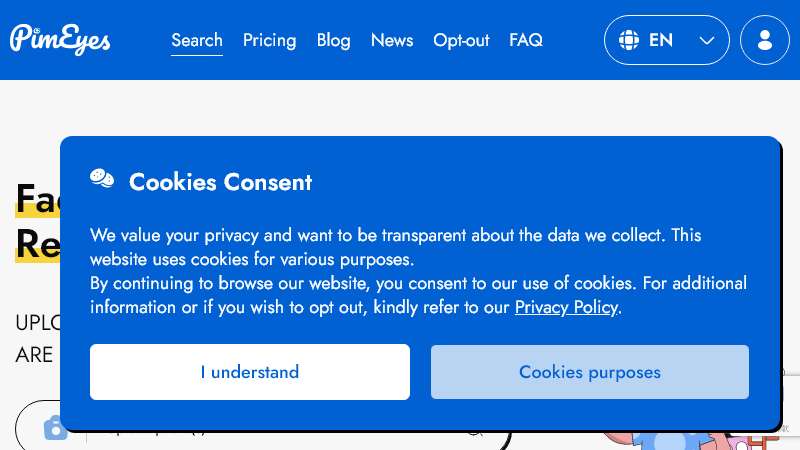PimEyes
- Updated:4/10/2025

Overview of PimEyes: AI-powered facial recognition search engine
PimEyes is an advanced online face search engine that utilizes artificial intelligence and facial recognition technology to find images of individuals across the internet. Launched in 2017, PimEyes allows users to upload a photo of a face and receive results showing where that face appears in other images online. The platform's stated purpose is to help individuals monitor and protect their online presence, but it has also raised significant privacy concerns due to its powerful capabilities and potential for misuse.
Key Features and Functionality
Facial Recognition Technology
PimEyes employs sophisticated AI algorithms to analyze facial features and match them across millions of images indexed from the open web. Key aspects include:
- Ability to find matches even with different backgrounds, angles, and lighting conditions
- Can identify a person in images where they are not the main subject
- Works with partial face visibility (e.g. when wearing sunglasses)
- Claims high accuracy, though exact rates are not publicly disclosed
Search Process
To use PimEyes, users follow these steps:
- Upload a clear photo containing the face they want to search for
- PimEyes analyzes the facial features and searches its database
- Results are displayed showing matching faces found online
- Users can access the source websites where images appear
Coverage and Limitations
PimEyes searches images from publicly accessible websites, including:
- News sites
- Blogs
- Company websites
- Public photo sharing platforms
However, it does not include results from major social media platforms or private/password-protected sites.
Use Cases and Applications
Personal Online Presence Management
PimEyes markets itself primarily as a tool for individuals to monitor and control their online image:
- Finding unauthorized uses of personal photos
- Identifying old or unwanted images for removal requests
- Discovering forgotten online accounts or mentions
Professional and Investigative Uses
While controversial, PimEyes has been used by various professionals:
- Journalists for research and fact-checking
- Private investigators for locating persons of interest
- Businesses for identity verification or background checks
Privacy Concerns and Controversies
Lack of Consent
A major criticism of PimEyes is that it collects and analyzes images of individuals without their knowledge or consent. This raises ethical and legal questions, especially in jurisdictions with strict data protection laws.
Potential for Misuse
Privacy advocates worry about PimEyes being used for stalking, harassment, or unauthorized surveillance. The ease of access to the tool amplifies these concerns.
Legal Challenges
PimEyes has faced legal scrutiny in multiple countries:
- In 2022, German privacy regulators opened proceedings against the company
- The UK's data protection watchdog received complaints about PimEyes in 2022
- A privacy lawsuit was filed against PimEyes in Illinois, USA in 2023
Company Background and Ownership
PimEyes has a complex ownership history:
- Founded in 2017 by Polish software engineers Lucasz Kowalczyk and Denis Tatina
- Sold to Face Recognition Solutions Ltd. in 2020, moving headquarters to Seychelles
- Acquired by Georgian academic Giorgi Gobronidze in 2021, now based in Dubai
The frequent changes in ownership and location have added to the controversy surrounding the company.
Pricing and Access
PimEyes operates on a freemium model:
- Basic searches are free but with limited results
- Paid subscriptions (starting at $29.99/month) offer more comprehensive results and additional features
- "PROtect" plans allow users to monitor and manage their online presence
Comparison to Other Search Tools
vs. Traditional Reverse Image Search
Unlike Google Images or TinEye, PimEyes focuses solely on facial recognition, allowing it to find matches across different contexts and image compositions.
vs. Clearview AI
While similar in capability, Clearview AI is restricted to law enforcement use, whereas PimEyes is publicly accessible. PimEyes also does not include social media in its search index.
Ethical and Policy Implications
Data Protection and Privacy Laws
PimEyes' operations challenge existing legal frameworks, particularly in regions with strict data protection laws like the EU's GDPR.
Balancing Innovation and Privacy
The technology raises questions about the trade-offs between technological advancement and individual privacy rights.
Need for Regulation
Many experts argue for clearer regulations around facial recognition technologies to prevent misuse while allowing beneficial applications.
User Protections and Opt-Out Options
PimEyes offers some measures for individuals concerned about their privacy:
- An opt-out process to remove one's face from search results
- Ability to blur or remove specific images from results (with paid plans)
- Alerts for new appearances of opted-out faces
However, critics argue these measures are insufficient and place the burden on individuals rather than the company.
Conclusion
PimEyes represents a powerful and controversial advancement in facial recognition technology. While it offers potential benefits for personal privacy management and legitimate investigative purposes, it also raises significant concerns about consent, data protection, and potential misuse. As facial recognition technology continues to evolve, PimEyes serves as a focal point for ongoing debates about balancing innovation with privacy rights and the need for clearer regulations in this rapidly advancing field. The platform's future will likely depend on how it navigates these complex ethical and legal challenges while addressing public concerns about its powerful capabilities.
Trending topics
Find the Perfect AI Tool for Your Needs
Discover powerful AI solutions curated by experts in the field

